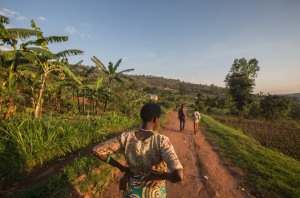Two weeks after I get back from Rwanda, who shows up but Paul Kagame? He is, of course, the president of Rwanda, and he’d been invited to MIT to give a lecture about the role of science and technology in African development. It is a little embarrassing, but I did in fact tear up a bit when he talked about the revolution that pre-paid electricity bills have been for the Rwandan economy. “Oh, Electrogaz!” I thought with a sigh.
I traveled all that way because the newspaper I write for regularly had been told there might be a chance for a one-on-one interview. To say I was bummed when it didn’t pan out is an understatement. I realize that, as a professional, every interview is equally important—but this would have been fascinating, a chance to talk to the leader of the country I’d just spent so much time in, and to understand where his inspiration to develop Rwanda as a knowledge-based economy came from. Anyone who’s been to Africa will appreciate how not obvious that choice is.
It’s a challenge anywhere on the continent to get regular power or move around on actual roads; the poverty of people living outside capitals can seem overwhelming–certainly it was in Sierra Leone–and one is left wondering what there is to do except simply give people food so that they can make it to the next day.
And that’s in places that aren’t recovering from genocide. So how does someone look at the isolated countryside, the dilapidated capital, and say, “We’re going to build a knowledge-based economy?” It is, to put it mildly, rather a profound statement of optimism.
It would have been fun to find out what was running through Kagame’s mind when he made that decision, why he believed it could work when so many other countries have gone a different direction. Profiles in Courage, Mr. Kennedy? Pshaw. I’m doing Profiles in Vision.
Alas, a girl can dream.
Post Script: It’s an argument that’s been made by others before, but Kagame gave a sweeping account of the total revolution that the cell phone has been in Africa. He must be working with good writers: I certainly saw evidence of this, and some of my friends in Rwanda had pointed it out, but he somehow makes the case with a dramatic flair that made the point seem new. He also took questions about population control, women’s participation in politics, and term limits. If you’re interested in the speech, MIT’s video is here.



